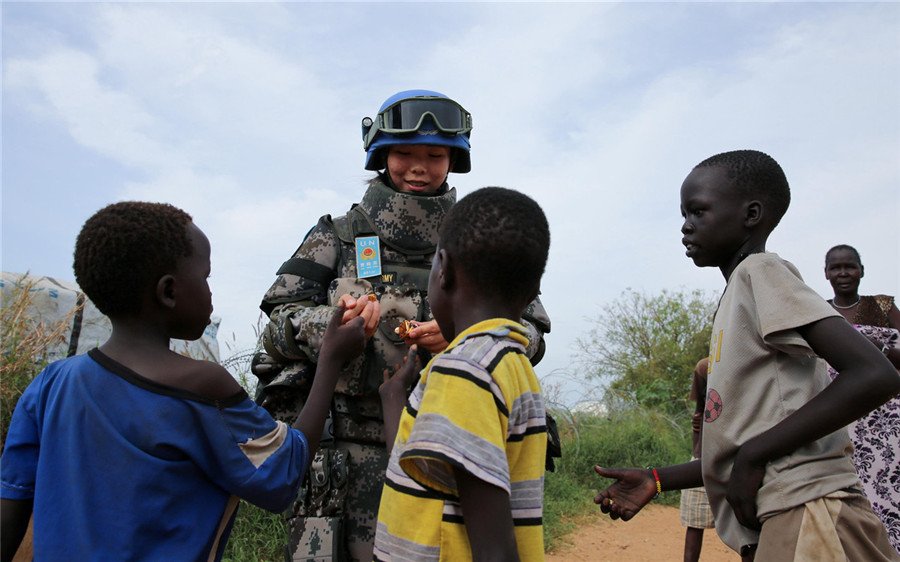Nation's peacekeepers empower Africa
For more than a decade, China has been playing a bigger role in protecting global peace. This is the fourth group of infantry soldiers drawn from the 83rd Combined Corps of the PLA.
Jia Xiaochen, a Chinese peacekeeper in the infantry squad shares candy with children in Juba. [Photo/Xinhua]
Growing stature
Joining the battalion at its camp during the Army Day celebrations, the deputy head of UNMISS, Moustapha Soumare, said the presence of Chinese peacekeepers was reassuring, given the complex situation and volatility in South Sudan.
"It is an indication that China is committed to peace in South Sudan. We are proud to have a competent and confident contingent here with us," he said.
As its global stature has grown, China has strengthened its role in peacekeeping missions.
It is the world's 11th-largest contributor of troops, with about 2,600 serving in Mali, the Democratic Republic of Congo and Liberia, among other countries.
Chinese peacekeepers have also earned praise in these and other nations.
In February, all 395 members of the fifth Chinese peacekeeping force to Mali, consisting of guards, engineers and medics, were awarded the United Nations Peace Medal of Honor for their dedication and outstanding contributions in the country.
Chen said: "Besides being soldiers, we are fathers, brothers and uncles. So we offer our sympathy, too, to the locals who have been weighed down by years of war and poverty."
Humanitarian assistance provided by the peacekeepers has included setting up medical camps and informing UN agencies of locals' needs, such as schools and educational equipment and supplies.
"Besides promoting a positive image of the UN, we are committed to enhancing understanding between the peacekeepers and the locals, because this synergy is crucial to fulfilling our mandate," Chen said.
He said he is proud that, under his watch, his troops have been diligent and disciplined.
"Our actions are speaking louder than words in our mission here. We are making our contributions to society by promoting peace and security in Africa, because we believe that war stymies development and robs people of their dignity and future."
Chen said there are at least four other battalions stationed in Juba-from Bangladesh, Rwanda, Ethiopia and Nepal.
Always aware of the dangers facing his troops, he said pre-deployment training has been improved.
The battalion has also improved communications and increased the number of information and operations personnel to ensure that patrols receive timely information about the situation on the ground. This is done together with UNMISS police, local law enforcement authorities and a civilian network.
"In addition, we undertake a monthly assessment to safeguard our troops' mental health. We keep close tabs on their daily work and rest schedules and encourage them to exercise. They carry equipment weighing at least 23 kilograms during foot patrols, and they have to be both mentally and physically prepared," Chen said.
While the infantry battalion is stationed in Juba, medical and engineering teams are in Wau, a city and state about 600 km from the capital.
Lieutenant Colonel Zhao Jihui, who is serving in Wau, said the 63-member medical team has earned admiration from colleagues for its strong sense of duty and strict adherence to the UN Code of Conduct.
The team supports at least 2,000 military personnel and UN officials, and assists some 30,000 displaced civilians, who are threatened by malnutrition and starvation.
"Because of the security situation, they are unable to farm... and others are afraid to go back to their farms. Besides, there is insufficient produce due to the weather conditions in this area and the fact that they still use traditional farming methods," Zhao said.
By last month, the team had handled 1,856 outpatient cases, 291 emergency cases and 72 inpatient cases, including 27 surgical patients. It also assisted in evacuating 10 patients to a hospital in Uganda.
The team handles many medical cases, ranging from hernias to severe appendicitis to rare cases of malaria.
However, difficult pregnancies pose a serious challenge, Zhao said. Such cases are referred to better-equipped hospitals, as the team avoids performing caesarian sections due to poor sanitation in the camp.
Nonetheless, in September last year, the team handled an emergency case and, after two days with round-the-clock observation and use of traditional Chinese medicine, the patient gave birth to a girl.
As the medical and engineering teams end their mission, they have become stronger through the invaluable lessons learned. They have honed their skills in a volatile environment and promoted cultural exchanges.
"The officers are drawn from different provinces back home, and after their African tour, they know more about the continent. And they now closely value China's independence and achievements," Zhao said.
He added that this has been his second mission serving as a UN peacekeeper. He was stationed in Liberia in 2005 and'06 and is happy that the 15-year mission there has ended after peaceful elections were held in December.
"China is committed to peace and security. Just as Liberia has found peace, so will South Sudan," he said.
Chen said news of a peace deal between the South Sudan government and warring factions was welcomed. The agreement was signed in June by President Salva Kiir and rebel leader Riek Machar.
"It is time the people here benefited from peaceful development. I can see from their faces that they are worn out from war. Peace should be valued, and China is happy to commit to this responsibility," Chen said.


